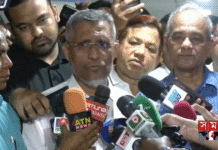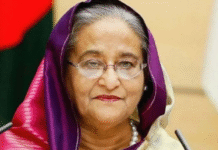10 December and Human Rights in Bangladesh
১২ ডিসেম্বর ২০২২

Source: Adopted from Human Rights Day | United Nations
A K M Zakir Hossain
Every year, the world observes 10 December as International Human Rights Day to commemorate the Universal Declaration of Human Rights (UDHR) that was ratified by the UN General Assembly on December 10, 1948. The Assembly enacted Resolution 423 (V) in 1950, inviting all States and relevant groups to proclaim December 10 as Human Rights Day. This was the official start of Human Rights Day. UDHR is a document that has been translated into over five hundred languages. The UDHR gave the account of “Human rights and fundamental freedoms” which was not categorized. The Universal Declaration proclaims two broad categories of rights: civil and political rights on the one hand and economic, social, and cultural rights on the other hand. Article-3 to 21 deal with civil and political rights while articles 22 to 27 deal with economic, social, and cultural rights.
The UN has declared the 75th International Human Rights Day’s theme for 2022 as “Dignity, Freedom, and Justice for All” Since the 1948 adoption of the Universal Declaration of Human Rights, more people around the world have perceived and protected these rights. Since then, it has served as the cornerstone of a growing system of protection for human rights that now pays particular attention to vulnerable populations like migrants, indigenous peoples, and people with disabilities.
The promise of the UDHR, however—of equality in rights and dignity—has consistently come under attack in recent years. The ideals and rights contained in the UDHR serve as benchmarks for our collective activities so that no one is left behind as the world faces new and continuous challenges such as pandemics, conflicts, rising disparities, a morally bankrupt global financial system, racism, and climate change. The UDHR has sparked numerous campaigns for better and more widespread recognition of human rights. The UDHR has been in effect for (almost) 75 years, during which time human rights have improved. Now there are 3 generations of human rights; Civil political rights as the first generation and ICCPR is the treaty of these rights. The Social, economic, and cultural rights are likened to the “second generation” of human rights, while ICESCR is the treaty for second-generation rights. Finally, third generation rights are collective group rights and such rights as the right to development, the right to self-determination and the right to environment.
According to article 25 of the Constitution of Bangladesh, the paramount provision relating to international law contained principles of international law including ‘international law and the principles enunciated in the UN Charter will be respected by State. The application of international instruments including UDHR in the domestic arena has been well announced further by the Supreme Court in BNWLA vs. Government of Bangladesh and others. However, Bangladesh failed to progress towards upholding human rights.
Amnesty International’s 2021 country report on Bangladesh states, there is a wide range of grave human rights issues in Bangladesh. The Government of Bangladesh is responsible for multiple human rights violations, including unlawful killings and disappearances, arbitrary arrest and detention, and torture. Some of these have been in response to attacks by armed groups claiming to act in the name of Islam.

Source: Adopted from Human Rights Day | United Nations
Another Joint Statement of 12 Human Rights Watchdogs on the occasion of International Human Rights Day mentions that, despite strong international criticism, the government of Bangladesh has intensified its crackdown on civil society organizations (CSO) and human rights defenders (HRD), and the suppression of civic space. Examples of this include the harassment against human rights organizations such as Odhikar. It is suppressing dissenting voices by enforcing repressive laws, including the Digital Security Act (DSA) and by filing criminal cases, including sedition and defamation charges.
Finally, on 09 December 2022, Human Rights Watch (HRW) mentioned how the political regime in power in Bangladesh has clampdown on opposition political activists while throughout their tenure has committed extrajudicial killings, enforced disappearances, arbitrary arrests, and torture allegedly to maintain power. The same report referred to Clement Voule, the United Nations special rapporteur on freedom of association and peaceful assembly, who said, “the authorities should guarantee the right to peaceful assembly and not use excessive force against protesters.”
We are all more at risk whenever and wherever humanity’s values are rejected. The solutions to today’s greatest crises are rooted in human rights. Transnational and generational effects result from human rights violations. Collectively, these can and must be overcome. We need to stand up for our rights and other people’s rights. Everyone is urged to speak up in support of human rights under the UDHR. Everybody has a responsibility. The UDHR calls upon everybody to stand up for human rights. Bangladesh’s government and all concerned should show respect to protect the human rights of every individual. Because human rights are fundamental to everyone, we must hold ourselves to the same standards. Human Rights Day serves as a reminder that all of us must protect human rights.
Writer: Human Rights Defender, Researcher and Teacher, Graduate Student at Northumbria University, UK.










